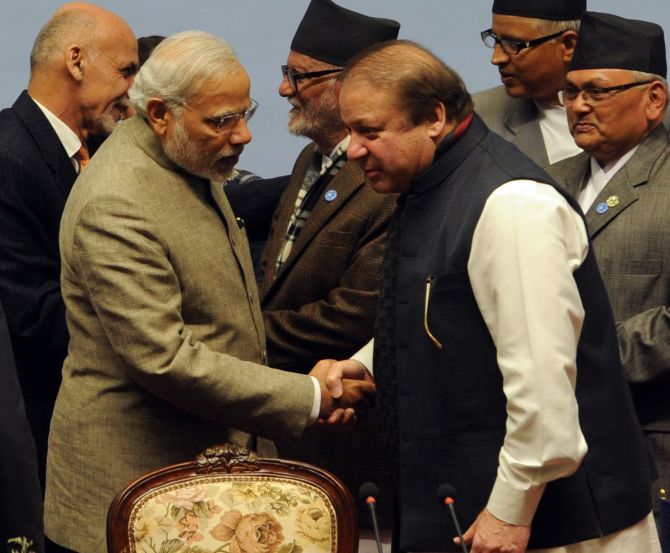
PM Narendra Modi and Pakistan's Prime Minister Nawaz Sharif meeting on the sidelines of the SCO Summit. Photograph: PTI
Prime Minister Narendra Modi seems to have secured a rare concession from Pakistan that ‘terrorism’ and not the issue of Kashmir be the central theme of the India-Pakistan dialogue.
The Pakistanis, meanwhile, were left with much explaining to do about the missing ‘K’ word from the text of the joint statement that was released after Friday’s meeting between Modi and Pakistan PM Nawaz Sharif in Ufa in Russia on Friday.
Former high commissioner to Pakistan G Parthasarathy thinks the joint statement signals a departure from the “wretched” composite dialogue agreed between the two neighbours by then prime minister Inder Kumar Gujral in 1997 and pursued by Manmohan Singh during the UPA1 years.
The composite dialogue had identified eight issues the two countries needed to address, including terrorism and drug trafficking. “To reduce the salience of terrorism and attach it to something like drug smuggling was silly,” Parthasarathy said.
An India-Pakistan Joint Anti-Terrorism Mechanism set up in 2006 remained a non-starter. KC Singh, who had headed this mechanism in its first two years, has pointed out how it had lost its relevance with the then UPA government failing to put enough pressure on Pakistan to address concerns on terrorism.
According to former diplomats, the change in Islamabad’s attitude has been a result of back-channel talks, its internal dynamics but as much because of the effectiveness of the Modi government in marginalising Pakistan within South Asia.
“Pakistan has always been a spoiler in Saarc. But India, in the Kathmandu Saarc Summit (in November 2014), took its eastern neighbours along to press ahead with issues of land connectivity and energy security,” Parthasarathy said.
In Kathmandu, Pakistan opted out of an agreement on better connectivity that made Prime Minister Modi come up with ‘BBIN’ or Bhutan, Bangladesh, India and Nepal connectivity. South Block views this as the emergence of the ‘Bay of Bengal entente’ within South Asia.
That Pakistan agreed to India's demand, despite the recent months of cross border firing and New Delhi “postponing” the foreign secretary level meeting after the Pakistani high commissioner met with Hurriyat leaders has also to do with Islamabad’s domestic concerns.
Within Pakistan, its army is currently embroiled in fighting the rebels in Balochistan and the Taliban in the North WestFrontierProvince. Pakistan is also facing an energy crisis with homes and establishments in Lahore getting only a few hours of electricity in a day.
However, the ability of Islamabad to deliver on its promise of addressing India’s concerns on terrorism, including sharing voice samples of the conspirators of 26/11 Mumbai terror attacks, remains to be seen. Interestingly, Islamic parties and groups of Pakistan have been conspicuously silent on the development, although other opposition parties criticised Sharif for “surrendering” to India by not discussing Kashmir.
Senior leader of the opposition Pakistan People’s Party Sherry Rehman termed the meeting as “one-sided” as Pakistan’s concerns were put on the backburner.
The Imran Khan-led Pakistan Tehreek-e-Insaf Vice-President Shireen Mazari said Sharif failed to highlight the Kashmir issue and Indian involvement in Balochistan. According to reports, the Islamic parties didn’t comment on the meeting.
Sharif’s Adviser on National Security and Foreign Affairs Sartaj Aziz said after returning from Ufa that the phrase “outstanding issues” in the joint statement covered Kashmir, Siachen and Sir Creek. According to the Dawn newspaper, Aziz said the two prime ministers agreed in their meeting in Russia to address these issues through back channels and Track II diplomacy.
He stressed that the priority was to lessen tensions at the border by meetings between the director-generals of the Border Security Force and Pakistan Rangers.
On Aziz’s suggestion that back-channels will resolve the Kashmir issue, several former diplomats are also of the view the basis could be the backchannel talks held from 2004 to 2007.
The two sides had agreed that making the line of control in Kashmir as a soft border to allow Kashmiris from both sides to meet frequently was the only way forward.






